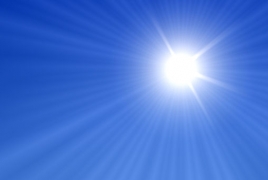 Harms and benefits of the SunAnother look at old dispute The sun is the center of our solar system, which gives energy and life to the Earth and its inhabitants. Sunbathing or heliotherapy is one of the oldest and ancient health care practice used to fight common illnesses, maintain general health and boost the immune system. PanARMENIAN.Net - Ultraviolet rays are responsible for the body to produce Vitamin D, which is crucial for human health. A deficit in this vitamin D is the likely cause of health problems related to inadequate sun exposure. Depriving the body of vitamin D benefits can lead to health problems like diabetes, prostate cancer, multiple sclerosis tuberculosis and rickets. UVA rays are used to treat certain diseases like psoriasis or eczema. Vitamin D is essential during pregnancy and nursing as adequate blood levels of Vitamin D have been linked to lower premature labor and overall complication risk. Low Vitamin D levels can put a mom at higher risk for gestational diabetes and can lead to bone or other problems for the baby. A recent study found that pregnant women should get more sun to increase several health markers for themselves and their babies. Vitamin D is linked to better survival rates for women with breast cancer. However, excessive sun exposure can cause various skin problems like sunburns, photo-ageing, dry skin, wrinkles, bags under the eyes, spots, and finally skin cancers. The incidence of both non-melanoma and melanoma skin cancers has been increasing over the past decades. Currently, between 2 and 3 million non-melanoma skin cancers and 132,000 melanoma skin cancers occur globally each year. One in every three cancers diagnosed is a skin cancer and, according to Skin Cancer Foundation Statistics, one in every five Americans will develop skin cancer in their lifetime. The latest story that shocked the world was the death of 18-year old Freja Nicholson and the outcry of the devastated mother, who covered Freja and her sister Lily head to toe in suncream when the family jetted off to exotic destinations such as Turkey and Thailand but did not think that the British sun can be dangerous for fair-skinned girls. Nevertheless, amid cancer fears, more and more studies suggest that refraining from sunbathing is actually more harmful than moderate and reasonable sun exposure. A major study done by Swedish researchers at the Karolinska Institute has found that persons who avoid the sun altogether actually have a higher risk of skin melanomas. They also have double the risk of dying from any health issue – including cancer. The study, which followed almost 30,000 women for 20 years, was recently published in The Journal of Internal Medicine. While sunlight exposure and ultraviolet radiation are cited as major causes of melanomas on the skin, dermatologist Dr. A. Bernard Ackerman says the link between sun exposure and melanoma have not been definitively proven. He points out that Asians and blacks tend to get melanomas on skin not exposed to sunlight, such as on their palms, the soles of their feet and mucous membranes. In fact, instances of the rickets have actually increased by four times in the past 15 years, corresponding with the increased promotion and use of sunscreen. The Swedish researchers believe guidelines advising people to avoid sun exposure without sunscreen could be causing harm, especially in areas of the world with less sunlight like Northern Europe or the Pacific Northwest area of the United States. A study carried out by the Universities of Southampton and Edinburgh suggests that medical advice on the risks and benefits of sunbathing may need to be rewritten. Scientists have claimed that sunlight may lower blood pressure – reducing the risk of serious heart disease. According to them, avoiding sunlight “out of fear” may be increasing our risk of cardiovascular diseases – including heart attacks and strokes – for which high blood pressure is a key risk factor. Thus, the benefits of sunlight outweigh the risks of cancer, as it has been found that 90 times more people die due to strokes and the heart maladies caused by high blood pressure than by melanomas. Lusine Mkrtumova / PanARMENIAN.Net Marriages by mail Green tourism on the rise in Syunik This winter is ideal for it The cableway, the shoe and the unicycle The growing trend of human microchipping Holy Etchmiadzin prefers solar energy Friendship heals |